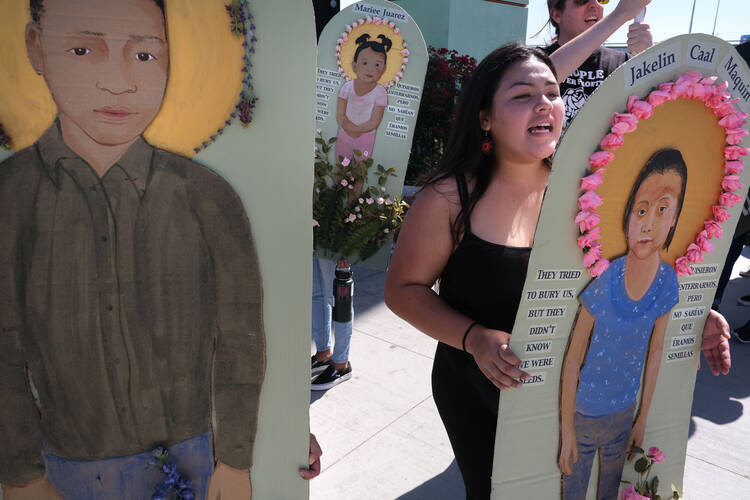I’m often weary these days. These are dark, painful times for our church and country. A former cardinal of Washington, D.C., has been defrocked for sexual abuse. The White House is occupied by a president who demeans people with rhetoric and hurts those on the peripheries with cruel policies. As a Catholic writer and commentator who focuses on the intersection of church and politics, I spend a lot of time talking to members of the media about contentious topics. Being a “professional Catholic” in the public square right now is heavy work.
The truth is it can breed cynicism and weigh down your soul.
What keeps me sane, even hopeful, is a halting evolution in my spirituality that requires learning to get out of my head and putting myself in uncomfortable places. I am a bookish introvert by nature, prone to bouts of wry detachment. For years, my journalistic disposition and reserved personality made me skeptical of activism. My faith life also gravitates toward words and intellect, more lectio divina than faith in action. But the more I step outside myself, the more I am rescued from these despair-inducing days by the sacrament of encounter and the holy witness of faithful advocates speaking truth to power. The teachers helping me down this road are young and old, citizens and undocumented, lay and ordained, straight and L.G.B.T.Q.
A year ago, I traveled to the U.S.-Mexico border with a delegation of Catholic priests as part of an immersion trip put together by my organization, Faith in Public Life. In El Paso, I met Ruben Garcia, the director of Annunciation House, a respite center that has provided shelter for more than 150,000 migrants over the past year alone. “What I’m asking you is to use your voice, use your pulpit, stand up for migrants and say, ‘What we are doing is wrong,’” he told us in what sounded like a prayerful plea.
What keeps me sane, even hopeful, is a halting evolution in my spirituality.
I have been graced to work with and learn from young, undocumented immigrants who leave me in awe of their courage. Arlin Tellez, a sophomore at Trinity Washington University, was only 4 when she crossed the border at night with her mother, clutching a prayer card her grandmother gave her. Ms. Tellez is now an organizer, public speaker and leading immigration activist. As a white man who has unearned privileges because of my race, gender and sexuality, I am reminded by young Catholics like Ms. Tellez that the more comfortable I get, the farther I am from the heart of the Gospel.
Pope Francis teaches us that our church is one that is “bruised, hurting and dirty because it has been out in the streets.” Christianity is not a collection of abstract principles that can be reduced to parsing and defending faceless propositions. The shattering mystery of the Incarnation is that God stands with us in our pain, anxiety, joy and longings. This gritty theology requires us to take risks and act.
“We have to put our bodies where our mouths are,” the 90-year-old sister Pat Murphy, R.S.M., told me before we joined 70 other Catholics arrested in Washington, D.C., in July during a civil disobedience action to protest the detention of immigrant children. I keep learning from people like her and the Rev. Bryan Massingale, a theologian at Fordham University who in a recent address on L.G.B.T.Q. Catholics bravely challenged the church to recognize all forms of exclusion, to see the connection between racial justice and L.G.B.T.Q. justice. “I will not bracket my ‘black’ self in order to be ‘gay’ so you can take what makes you comfortable,” he said. “You have to take all of me. I don’t want to spend my energies building a church or world where only part of me is welcomed, valued and loved.”
The church of prophets and faithful agitators will continue to lead us.











Show me where the son of Miriam grew up to be a charismatic leader and fountain of wisdom, gathered a following and formed them into a force which either placed him, the true king, on the throne occupied by Herod or overthrew the occupying imperial Roman force and liberating the the chosen people of God or both and I will sit up and take notice.
As it is, responsible men and women have read the account of his life, teaching, suffering, death, resurrection and ascension for two thousand years and correctly understood that he REFUSED the role of revolutionary and forged a different path for his faithful believers.
You may be a universalist, you may be a revolutionary, you may fancy yourself as a prophet but you are mistaken if you believe that the Holy Spirit has assigned these roles to you twenty one centuries after the communion of saints has been working to the tune of a different drum.
The Holy Roman Catholic Church is NOT a universal NGO assigned to pressuring governments into obeying the Ten Commandments Plus their neo-Marxist elaboration and feeding everyone with slices of the magic pudding.
Do you not get a TINY clue that Bill "Priapism" Clinton and Donald "Big Mouth" Trump sing from the same songsheet about secure borders?